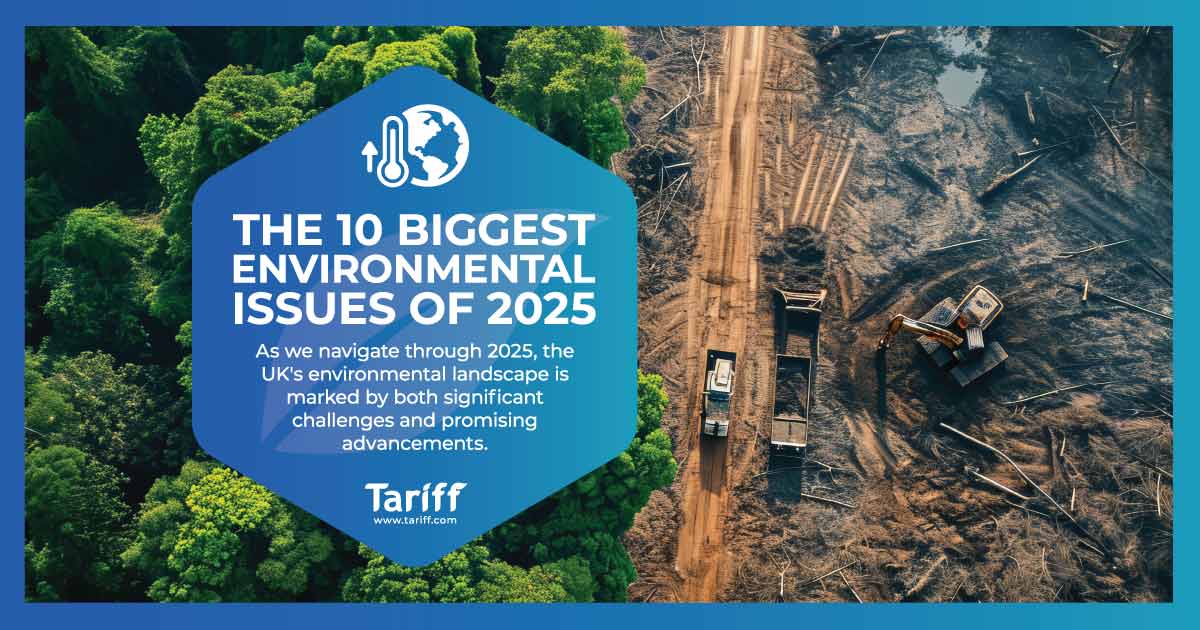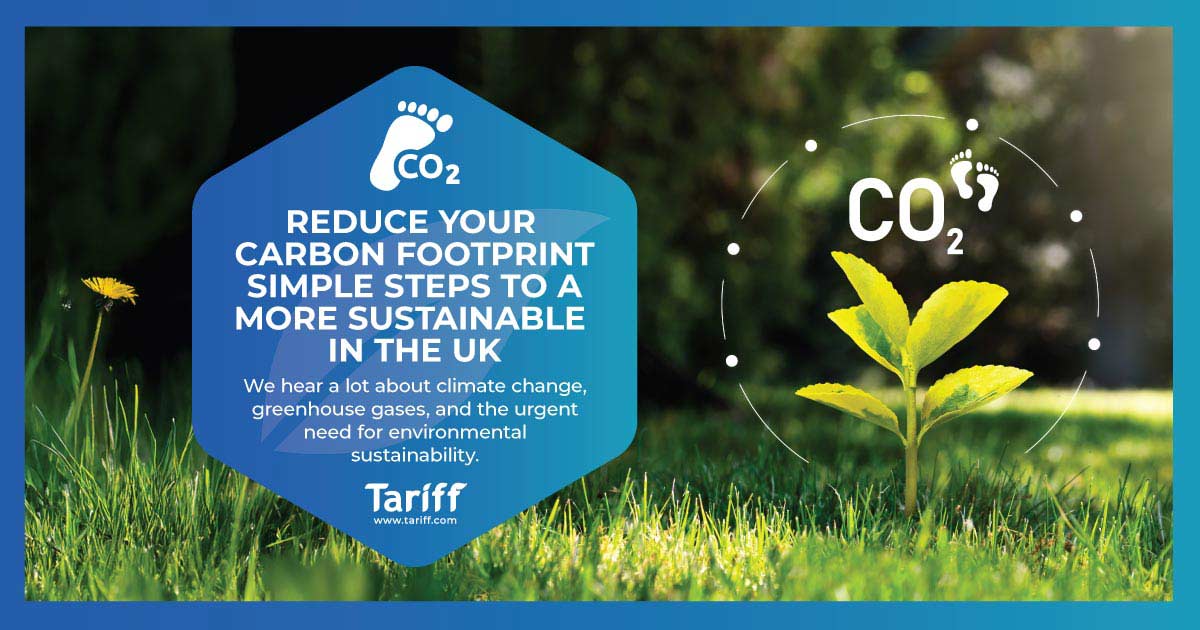Sunak’s U-Turn – The Changing Climate Commitments Explained
On the 20th September 2023, UK Prime Minister Rishi Sunak laid out a string of new green policies and proposals, to what’s best described as a mixed response from both sides of the political spectrum.
The announcements came largely as a surprise, with extended deadlines and new goals outlined for what had, until that day, been long-standing targets for businesses and homeowners alike. Changes to plans for electric vehicles, net-zero commitments, and energy efficient boilers dominate the headlines, and further contribute towards the underlying issue in all of this – climate change.
That’s the focal point of Tariff’s latest article. We’ll break down the key changes ushered in with Sunak’s latest statement, what they mean for you, your business and the environment, and how they’ll ultimately shape our as-yet uncertain future.
Climatological Conundrum – 4 Pivotal Points From The PM’s Plans
The speech began as many political pontifications do, with the usual rhetoric we’d expect from something that’s aimed to rouse a response from correspondents and citizens. However, it’s fair to say that few could see coming the tumult that’s arisen from the aftermath of the Prime Minister’s new plans for the future.
Here are 4 of the more stand-out proposals from Rishi Sunak’s speech, and why they’ve become the talking points across news outlets and social media.
1. New Model Petrol & Diesel Cars To Remain Until 2035
Perhaps one of the more pioneering plans introduced in the wake of the COP26 summit was the UK’s commitment to halting the production of new petrol and diesel cars from 2030 onwards.
An unprecedented step across mainland Europe, and one that was met with an impassioned response from both sides of the coin, it stood steadfast as a bastion of the country’s commitment to a brighter future.
The decision to extend the deadline to 2035 is, to say the least, one that’s caused a significant stir. The frustrations behind this stem from multiple places, of course, but the chief among these is the impact it’ll doubtless have on the manufacturers.
Both major and smaller companies had already begun to order in specialist parts, with motor housing, chassis and frameworks all requiring more advanced and often expensive technologies. That’s naturally been put on hold, with firms finding themselves out of pocket and in possession of equipment and kit that’s now effectively been shelved for an additional 5 years.
That’s not to mention the often rigorous training and time investment that goes into preparing for such a large scale difference. When comparing petrol cars to their electric cousins, there’s key considerations that need to be made, and such a delay has meant a knock-on effect across the sector.
More widely, more petrol and diesel cars unequivocally means greater levels of emissions which, while we dangle at the precipice of irreversible climate damage, seems counterintuitive. While the government’s initial plans sought to offset this, it’s clear that a backtrack does in some way disregard that precarious position.
2. Off-Grid Fossil Fuel Sources In Use Until 2035
An off-grid power supply refers to anything that’s not connected to the mains electricity or gas grid. You’ll most often find these in more rural or difficult-to-reach properties, where residents will use independent generators to provide power, heat and lighting.
Most of these sources will require a noticeable amount of non-renewable energy (such as oil and coal) to power, which not only isn’t conducive to a greener and more eco-friendly future, it’s also simply not maintainable in the long term as we globally shift away from fossil fuels.
Initially, the government had a plan in place to phase these out by as soon as 2026 – lauded as a challenging yet necessary solution to the UK’s off-grid issues.
With Sunak’s latest policies, however, this has been delayed by almost a decade, falling in line with the aforementioned push back on the petrol car deadline. One of the more contentious parts of the PM’s addressal, it’s a policy that’s doubtless raised eyebrows, especially when the technology already exists to combat these issues.
With air source heat pumps and geothermal generators already widely available, and funding put aside in the Chancellor’s budget, the delay can only be attributed to possible infrastructural issues, or to an incomplete plan for the roll-out of these innovations.
Not only does this cast the future of energy for rural properties into the roiling seas of uncertainty, it’s also another instance of technology that’s been brought in being placed into an ill-defined hiatus. As businesses look to fit these new devices, and homes look to plan for a changing energy landscape, it stands to reason that this places some level of pressure on many.
4. Upcoming Energy Efficiency Regulations Scrapped
A major pillar of the environmental policies laid out by Sunak’s and his predecessors’ government, the schemes aimed at improving the energy efficiency of homes were subject to much scrutiny from both critics and supporters.
However, with an ominously looming deadline in the 2050 net-zero commitment, these policies illuminated a way forward for what’s already a struggling economy and energy market. Crucial funding was stumped up, and put aside to better revolutionise the often outdated boilers in properties across the country.
With the PM’s latest statements however, there’s a distinct air of uncertainty. These goals are now scrapped in favour of a less-than-clear guidance, stating that homeowners will only need to replace inefficient gas boilers with electric heat pumps when there’s a need for a replacement.
That’s not only bad news for the planet as a whole – it’s also a blow to those who were hoping to heat their homes in a more efficient and effective way, particularly in older-build properties, or those without the requisite funds to invest in a new boiler.
With many facing a cold winter, and more still thrown into disarray by the government’s inconsistency, it’s reversals like these that shake public faith. There is a slight silver lining, however. In the same breath, Sunak announced plans to double the grant funding for boiler upgrades to £7,500. For some, though, this may prove to be closing the stable door after the horse has already bolted.
5. Net-Zero By 2050 Is Still On Track
Sunak concluded the speech on what you’d hope to be a positive note – the UK is still on track to meet the worldwide goal of net-zero by 2050. That reassurance comes in spite of the new plans the Prime Minister outlined in this latest address, and sought to assuage the concerns that would inevitably follow.
The UK government set out to be pacesetters a few years ago, spearheading investments and initiatives that allowed us to accelerate towards that goal at a faster rate than the vast majority of our neighbours.
That’s something Sunak has still aimed to preserve following the recent announcements. He’s conscious of the UK’s status as one of the frontrunners in the shift towards a carbon neutral future, and is confident that, even with these changes, there’s still scope for us to retain that title.
The PM hailed these changes as bringing about a “fairer and better” transition to the larger-scale adjustments that 2035 and beyond will bring about. It’s doubtless something that would’ve been a concern, and speaks to those who might have been uncertain about how they might have accommodated that change.
Nevertheless, the Prime Minister is adamant that this won’t undermine the Herculean efforts that have already been put into place. In his speech, he vehemently defended the decisions he’d outlined, stating they would “absolutely not” slow down the concerted efforts we’ve already seen.
However, sceptics have said that this remains to be seen, and that the changes Sunak has deigned to make with this latest speech will have ramifications that we’ve yet to see.
What Has The Response Been To Sunak’s Changes?
All in all, there’s been a mixed response to the latest developments. That extends beyond opposing political parties (whom one would expect to disagree) to include climate activist groups, political reporters and even members of the PM’s own party.
Those who support the proposed changes are equally widespread, and show a surprising cross-section of the public, as well as the political spectrum and business sphere. Sunak’s closest allies in his party, including the Secretary of State for Business and Trade Kemi Badenoch and Home Secretary Suella Braverman, have publicly backed the move.
Badenoch has been particularly vocal in her support of the Prime Minister’s changes, saying that the rollbacks are “the right thing to do”, and that the PM hadn’t done this as some form of “cynical ploy”, but rather as a path towards a more sustainable future.
Those sentiments are echoed by the Countryside Land & Business Association, who believe that the row-back on the policy for off-grid power sources offers the opportunity for rural homeowners further opportunity to prepare, with their estimates placing the number of people affected by the change at over a million homes.
Similarly, Jaguar Land Rover, one of the UK’s largest independent car manufacturers welcomed the change to petrol and diesel cars with open arms, calling Sunak’s decision one that was “pragmatic”. However, that opinion isn’t shared across the sector, with Ford lambasting the move as lacking the three core principles of “ambition, commitment, and consistency” needed for sustained growth.
The Conservative party itself shows similar fissures. While some of the party’s more recognisable names backing the PM to the hilt, there are others who have voiced their scepticism. Boris Johnson, a former prime minister himself, was one of the more strident in doing so, referring to Sunak’s backtracking as “faltering” and “losing ambition”.
Zac Goldsmith, the former Environmental Minister for the Tory Party, took Johnson’s words a step further, damning Sunak’s words as a “moment of shame” in what had otherwise been a successful Conservative reign thus far.
Elsewhere on the political field, there’s been widespread condemnation from opposing parties, as is to be expected. Labour’s Ed Miliband has openly said that he’s to challenge Sunak’s reimagined policies in the next debates, stating that he’ll be sticking to the original plans to phase out petrol and diesel vehicles by 2030.
The Scottish National Party (SNP) have been equally critical, with the BBC reporting that the party view the reversal of policy as “selfish and irresponsible”. That’s an attitude shared by the vast majority of environmental activists, too, with some even suggesting that the PM could face legal proceedings as the policies come to pass.
Greenpeace have derided the policy rollbacks, with their Head of Politics Rebecca Newsom stating the changes herald that “Britain is no longer seen as a serious player in the global race for green growth”. Oxfam’s climate change specialist Lyndsay Walsh had a likewise negative opinion, saying that this change was a “betrayal of people living in poverty”.
Overseas, the ripples are just starting to filter to world governments. At the UN’s Climate Summit, the former Conservative minister Sir Alok Sharma told the BBC that word of Sunak’s decisions had been met with “consternation”, and that we could see other countries following suit on the changes we’ve seen from the PM.
There’s likely to be further opinions, both supportive and derisive, vocalised over the next few days, and it’s unlikely we’ve heard the last from some of the UK’s – and the world’s – most affected parties.
What Next?
Truthfully, there’s no right or wrong answer to this question. Many are still reeling from the revelations of Sunak’s latest speech, and it’ll be a few days before the dust settles and we’re able to see how businesses, homeowners and political activists have responded to the news.
In that time, it’s important to familiarise yourself with what this could mean for our environment, and where we currently stand. At Tariff, we’re constantly striving to providing to not only offer a clearer path forward, but to inform our customers and our readers.
If you’d like to learn more about the climatological abyss we find ourselves facing, we’d recommend these 3 articles:
- The 10 Biggest Environmental Issues Of 2023
- What Is Climate Anxiety? Definition, Triggers & Coping Strategies
- What Is The Willow Bill? Divisive Climate Project Explained
We’re firm believers that effective education and understanding is the key to moving forward, and we aim to do that with every article we publish.




